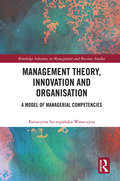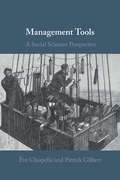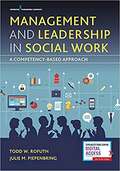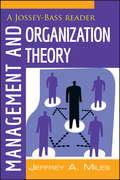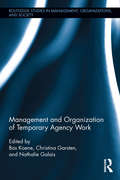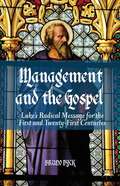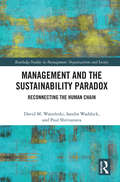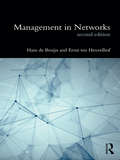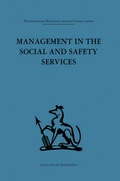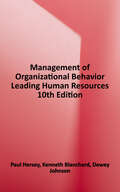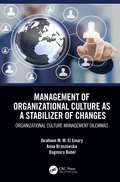- Table View
- List View
Management Practices in Asia: Case Studies on Market Entry, CSR, and Coaching
by Christiane Prange Ralph KattenbachAsia is a continent of contradictions and boundaries; it offers exciting business opportunities, but is also characterized by unpredictability and conflict. While flexibility and creativity are in the DNA of many startups in China, major players like Xiaomi and Alibaba have also emerged as global giants, challenging established global competitors. The authors of this book show that these companies are crossing various boundaries – between cultures, mindsets, and perspectives. At the same time, Western companies entering Asian markets face challenges that are very different from those on their home turf. This book addresses the needs of current and future managers doing business in Asia, who need to understand the individual, social and business challenges that can arise from crossing boundaries. The respective case studies provide essential insights on how several Asian companies have made impressive strides towards becoming established players; how the revival of local brands and growing pride in local products has become a major challenge for global competition; how the need to actively practice corporate social responsibility in Asian markets is currently challenging many companies; and how the need for individual and team coaching among the members of management to support a company’s development has grown tremendously, calling for new solutions.
Management Theory, Innovation, and Organisation: A Model of Managerial Competencies (Routledge Advances in Management and Business Studies)
by Katarzyna Szczepańska-WoszczynaCompetencies are a component of human capital and one of the most important assets of an enterprise. They play an important role in strengthening the position of the company in a competitive market. Investing in the development of competencies increases the organisation's ability to grow and compete through innovations. This book presents a multi-dimensional analysis of the relationship between managerial competencies and innovations. It analyses the role of a manager in a modern organisation, functions performed by managers, management styles and key challenges, including shaping behaviour in the process of managing change in an organisation, as well as an analysis of the structure of competencies, in particular managerial competencies, and the conditions of the process of forming managerial competencies. Management Theory, Innovation and Organisation: A Model of Managerial Competencies illustrates the organisational conditions of innovativeness, which is the relationship between strategy, structure, organisational culture and leadership and knowledge management and innovation management. The developed model can undoubtedly be considered the author’s pioneering contribution to the studies of managerial competencies and innovativeness. The book will be valuable to researchers, students, and managers in the fields of leadership, organizational studies, innovation management, and human resource management.
Management Tools: A Social Sciences Perspective
by Patrick Gilbert Ève ChiapelloNo organization is immune from the influence of management tools. Such tools as norms, indicators, ranking, evaluation grids and management control systems have moved outside the managerial and consultancy realm within which they were first developed to reach public administrations and policy-makers, as well as a range of other governmental and non-governmental organizations. Taking management tools out of the practical and utilitarian contexts to which they are often consigned and approaching them from a social analytical perspective, this book gives primacy to these everyday objects that constitute the background of organizational life and remain too often unquestioned. Bringing together developing streams of research from anthropology, political science, social psychology, sociology, accounting, organisation theory and management, Ève Chiapello and Patrick Gilbert offer an unprecedented theoretical synthesis that will help managers, scholars and policy-makers to unpack the functional and dysfunctional roles and effects of management tools within and across organizations.
Management and Governance of Intergovernmental Organizations (Elements in Public and Nonprofit Administration)
by Angel Saz-Carranza Marc Esteve Ryan FederoWhat happens to intergovernmental organizations (IGOs) after their creation has remained in mystery over the years. Although the current globalized outlook has sparked new and growing interests on the role that IGOs play in the global landscape, the scholarship has largely focused on the political aspects of cooperation, primarily on how and why different IGO member states interact with each other and the outcomes associated with such cooperation. Research is yet to untangle how these organizations work and operate. This Element addresses this niche in the literature by delving into two important aspects: the management and governance of IGOs. We build on a four-year research program where we have collected three types of different data and produced several papers. Ultimately, the Element seeks to provide scholars with a description of the inner workings of IGOs, while providing guidance to policymakers on how to manage and govern them.
Management and Industry: Case studies in UK industrial history (Routledge Focus on Industrial History)
by John F. Wilson Steven Toms Nicholas D. WongThis shortform book presents key peer-reviewed research selected by expert series editors and contextualised by new analysis from each author on how the specific field addressed has evolved. With contributions on the ‘historic turn’ in management studies, workers’ rights, occupational health, industrial networks and the development of the organisation, practices and principles of large UK businesses, this volume provides an array of fascinating insights into industrial history. Of interest to business and economic historians, this shortform book also provides analysis and illustrative case-studies that will be valuable reading across the social sciences.
Management and Information Technology after Digital Transformation (Routledge Studies in Innovation, Organizations and Technology)
by Peter Dahlin Peter Ekman Christina KellerWith the widespread transformation of information into digital form throughout society – firms and organisations are embracing this development to adopt multiple types of IT to increase internal efficiency and to achieve external visibility and effectiveness – we have now reached a position where there is data in abundance and the challenge is to manage and make use of it fully. This book addresses this new managerial situation, the post-digitalisation era, and offers novel perspectives on managing the digital landscape. The topics span how the post-digitalisation era has the potential to renew organisations, markets and society. The chapters of the book are structured in three topical sections but can also be read individually. The chapters are structured to offer insights into the developments that take place at the intersection of the management, information systems and computer science disciplines. It features more than 70 researchers and managers as collaborating authors in 23 thought-provoking chapters. Written for scholars, researchers, students and managers from the management, information systems and computer science disciplines, the book presents a comprehensive and thought-provoking contribution on the challenges of managing organisations and engaging in global markets when tools, systems and data are abundant.
Management and Leadership in Social Work: A Competency-based Approach
by Todd W. Rofuth Julie PiepenbringFull of expert guidance on leadership and management, this unique book is geared specifically to the needs of social work administrators, educators and practitioners in both academic and agency settings. The contents are fully comprehensive and encompass both theoretical approaches to management and leadership plus a wide variety of practical strategies that can be directly applied to practice. <p><p> Topics blend the art and science of leadership and management and incorporate all competencies and practice behaviors required by Network for Social Work Management (NSWM) and Council on Social Work Education (CSWE). These include understanding different leadership styles, practicing self-reflection and self-care, methods to motivate teams and mentor others, developing strategic plans, understanding financial management, marketing, fundraising, human resources, program evaluations, community collaboration, and much more. Additionally, the text illustrates the parallels/disparities between social work practice skills, knowledge, and ethics, and those of leadership and management. Instructor resources include PowerPoints for each chapter, lecture notes, and sample syllabi. Print version of the book includes free, searchable, digital access to entire contents. <p><p> KEY FEATURES: <p><p> Geared specifically to the needs of social work educators and practitioners in academic and agency settings Incorporates all competencies and practice behaviors required by NSWM and CSWE as cited in each chapter Discusses the differences between management and leadership along with best practices Fosters knowledge and skill development through the use of competency-based real-life cases, self-reflective exercises, and thought-provoking questions Offers examples of how to motivate and work with different age cohorts, community groups, and other stakeholders Addresses the challenges of financial management and fundraising Exhibits specific problem-solving and decision-making strategies
Management and Organization Theory
by Jeffrey A. MilesManagement and Organization Theory offers a summary and analysis of the 40 most popular, researched, and applied management and organization theories. This important resource includes key instruments used to measure variables in each theory and examines pertinent questions about the theory: strengths and weaknesses, practical applications, and the seminal articles published on each theory. "This is a remarkable book. Jeffrey Miles clearly explains and synthesizes 40 major theories of management and organization in an easily accessible and engaging style. Well researched, comprehensive in its coverage, thorough, balanced, and fair in its analyses of theories, the book is destined to be a major authoritative reference in the field. It is one of the most readable, informative, and useful books I have read. I strongly recommend it. " -Shaker A. Zahra, department chair, Robert E. Buuck Chair, and professor, Strategic Management and Organizations Department, University of Minnesota "This book provides a terrific advantage to any student or manager seeking to grasp the fundamental concepts that explain organizations and the behavior of people within them. "-Richard L. Daft, author, The Executive and the Elephant: A Leader's Guide to Building Inner Excellence; and the Brownlee O. Currey Jr. Professor of Management, Owen Graduate School of Management, Vanderbilt University "An easy-to-read summary of some of the most critical theories in the field of management-theories that have implications not just for scholars, but for practicing managers as well. " -Jay Barney, professor of management and human resources, and Chase Chair for Excellence in Corporate Strategy, Fisher College of Business, The Ohio State University
Management and Organization of Temporary Agency Work: Management And Organization Of Temporary Agency Work (Routledge Studies in Management, Organizations and Society)
by Christina Garsten Bas Koene Nathalie GalaisOver the past two decades the use of flexible employment relations has increased in most developed countries. The growth of temporary agency work constitutes a significant component of this development. Organizations are now facing the challenges of managing a ‘blended workforce’, i.e. a workforce consisting of both direct hires and contractors. At a time when Europe, as well as the rest of the world, is facing enhanced global competition and a severe labor market crisis, an understanding of temporary employment practices becomes all the more acute. With the evolution of the use of agency work in the Western world over the past decade, the chapters in this volume show how a focus on the management and organization of temporary agency work can be helpful to see possibilities and pitfalls for the use of temporary employment in the wake of changed employment practices and challenges to labor market stability and welfare structures. Together, the new case studies presented in this volume provide a wide scope of analysis of the organization and management of temporary agency work, offering a much-needed contribution to the discussion of issues and priorities that guide and shape organizational practices today. Its particular uniqueness lies in the empirical richness and variety of local case studies and the way in which these are related to wider policy aims, ideological shifts, and the dynamics of organizational practice, with a particular focus on the organization and management of ‘blended workforces’.
Management and Organizational History: A Research Overview (State of the Art in Business Research)
by Albert J. Mills Milorad M. NovicevicManagement and organizational history has grown into an established field of research with competing and contrasting approaches and methods that are relevant for management and organization studies. This short-form book provides readers with expert insights on intellectual interventions in management and organization history. The authors illuminate the central ideas, works, and theorists involved in forming the link between history, management, and organization studies, particularly focusing on the debates addressing the need for a 'historic turn' in management and organizational studies. With coverage of nascent schools of thought in management historiography, such as ANTi-History, revisionist history, counter-history, rhetorical history, the Copenhagen School, microhistory, critical realist histories, alongside existing modernist and post-modernist approaches, as well as postcolonial, decolonial, and feminist critiques, the book is essential reading for scholars and students learning or exploring the role of history in management and organization studies.
Management and Organizations in Transitional China (Routledge Studies in International Business and the World Economy)
by Lisa Keister Yanlong ZhangChina’s 30-year market transition and its integration into the world economy provide a unique opportunity for exploring the nature of large-scale economic and political transformation and the mechanisms underlying organizational behavior during such a transition. Management and Organizations in Transitional China explores how managers and firms cope with transition-related challenges by adapting to, manipulating, or even creating the complex institutional environment. This book examines the way transitional institutions shape individual decisions and organizational strategies, the mechanisms that promote the diffusion of innovative management practices and economic policies, and the formation and evolution of interfirm networks. Based on a comprehensive review of the studies on market transition, this book investigates how firms manage their relationship with important stakeholders in the environment. It highlights the importance of network-based strategies for institutionally less-advantaged actors (like private firms, foreign entrants, and entrepreneurs) to establish legitimacy, gain institutional support, and mobilize financial resources. Moreover, this book studies the mechanisms that facilitate the adoption of innovative management practices and economic policies in the transitional context, comparing the mainstream diffusion theories and evaluating the relative potency of the diffusion drivers. Furthermore, Management and Organizations in Transitional China provides empirical analyses using longitudinal data of alliance formation, network evolution, and the effect of both alliance formation and network evolution on firm decision-making and performance. Combining theory, data analysis, and rich contextual description to provide a comprehensive understanding of the organizational transition process, this book will appeal to scholars and practitioners in general management, organizational studies, international business, entrepreneurship, and related disciplines.
Management and the Dominance of Managers (Routledge Studies in Management, Organizations and Society)
by Thomas DiefenbachManagers are powerful. The organizations of our time are in essence managerial organizations, even our societies are managerial societies. This book looks behind the portrait of management as value-free ‘technicality’ and challenges the image of managers as the selfless pursuer of an organization’s survival and development. It explains that individual interests and careers of managers are only part of a wider epochal and historic picture – the picture of managers as the new ruling class using and misusing organizations for their own personal and group interests while portraying their own roles and actions as ‘increasing the efficiency of organizations’ and ‘serving the public interest’. But why exactly are managers so powerful? Why and how do managers dominate our organizations? It will be argued that the prevailing understanding of management and managers is only at the surface about functional aspects. In its very core management has been, and is, all about the power and control, interests and ideology of managers--in short, the dominance of managers over other groups of people. In order to investigate and explain this dominance, a multi-dimensional ‘theory of social dominance of managers’, will be developed which reveals the personal and group interests behind such claims and is based in its core on three explanatory factors; power, interests, and ideology. These factors themselves will be analyzed as comprehensive, multi-dimensional and interdisciplinary concepts in order to address the complex nature of managers’ dominance appropriately.
Management and the Gospel
by Bruno DyckThe goals of Management and the Gospel: Luke's Radical Message for the First and Twenty-First Centuries may appear to be simple: it describes what management theory and practice looked like in the first century, uses this as a lens to examine what the Gospel of Luke says about management, and draws out implications for today. However, the book is quite profound in finding that management is a dominant theme in the Gospel, that its message is consistently counter-cultural, and that Luke contains a four-phase 'how to' process model to help readers to implement change. Readers will acquire a new way to understand the Gospel as well as the moral foundations of modern management.
Management and the Sustainability Paradox: Reconnecting the Human Chain (Routledge Studies in Management, Organizations and Society)
by Paul Shrivastava Sandra Waddock David M. WasieleskiManagement and the Sustainability Paradox is about how humans became disconnected from their ecological environment throughout evolutionary history. Begining with the premise that people have competing innate, natural drives linked to survival. Survival can be thought of in the context of long-term genetic propagation of a species, but at the same time, it involves overcoming of immediate adversities. Due to a diverse set of survival challenges facing our ancestors, natural selection often favored short-term solutions, which by consequence, muted the motivations associated with longer-range sustainability values. Managerial decisions and choices mostly adopt a moral calculus of costs versus benefits. Managers invoke economic and corporate growth to justify virtually any action. It is this moral calculus underlying corporate behavior that needs critical examination and reformation. At the heart of it lie deep moral questions that we examine in this book, with the goal of proposing ethical solutions to the paradox. Management and the Sustainability Paradox examines the issue that there appears to be an inherent paradox between what some businesses view as "a need for progress" and " a concern for sustainability". In business, we often see a collision between ideas of progress and sustainability which shapes corporate actions, and managerial decisions. Typical corporate views of progress involve the creation of wealth, jobs, innovative products, and social philanthropic projects. On the basis of these "progressive" actions they justify their inequitable distribution of surpluses by paying low wages and exploiting ecological resources. It is not difficult to see the antagonistic interplay between technological and social innovation with our values for social and environmental well-being and a dualism that needs to be overcome. This book is intended for a broad appeal to an academic and policy maker audience in the sustainability and management fields. The book will be of vital reading for managers seeking to reconnect our human chain with the natural environment in the cause of sustainable business.
Management and the Worker (The\making Of Sociology Ser.)
by William J. Dickson F. J. RoethlisbergerThis is the official account of the experiments carried out at the Hawthorne Works of the Eastern Electric Company in Chicago. These were divided into test room studies, interviewing studies and observational studies. The test room studies were experiments into what variables in a workplace environment might affect worker fatigue. The findings of these tests led to extensive interviewing on the attitudes of the workers. The final phase of the Hawthorne experiment focused on social factors, using techniques of cultural anthropology to observe small working groups. The results of these experiments profoundly influenced the Human Relations movement.
Management in Komplexität und Unsicherheit: Für agile Manager (essentials)
by Wolfgang ViewegWolfgang Vieweg behandelt die Frage, wie Management in komplexer, volatiler und unsicherer Umgebung nachhaltig erfolgreich sein kann. Warum versagen die herkömmlichen Ansätze? Und was konkret sichert zukünftigen Erfolg? Zwischen ,,kompliziert" und ,,komplex" liegen Welten: Heutiges Management, das dazu neigt, alles auszureizen, alles auf die Spitze zu treiben, steht vor einem fundamentalen Wandel. Erst eine neue Herangehensweise an die Welt, neue Konstrukte und neue agile Methoden gestatten es, mit Komplexität artgerecht und nutzbringend umzugehen.
Management in Networks: On Multi-actor Decision Making
by Ernst Ten Heuvelhof Hans De BruijnGetting what you want – even if you are the boss – isn’t always easy. Almost every organization, big or small, works among a network of competing interests. Whether it’s governments pushing through policies, companies trying to increase profits, or even families deciding where to move house, rarely can decisions be made in isolation from competing interests both within the organization and outside it. In this accessible and straightforward account, Hans de Bruijn and Ernst ten Heuvelhof cast light on multi-stakeholder decision-making. Using plain language, they reveal the nuts and bolts of decision-making within the numerous dilemmas and tensions at work. Drawing on a diverse range of illustrative examples throughout, their perceptive analysis examines how different interests can either support or block change, and the strategies available for managing a variety of stakeholders. The second edition of Management in Networks incorporates a wider spread of international cases, a new chapter giving an overview of different network types, and a new chapter looking at digital governance and the impact of big data on networks. This insightful text is invaluable reading for students of management and organizational studies, plus practitioners – or actors – operating in a range of contexts.
Management in Networks: On multi-actor decision making
by Ernst Ten Heuvelhof Hans De BruijnGetting what you want – even if you are the boss – isn’t always easy. Almost every organization, big or small, works among a network of competing interests. Whether it's governments pushing through policies, companies trying to increase profits, or even families deciding where to move house, rarely can decisions be made in isolation from competing interests both within the organization and outside it. In this accessible and straightforward account, Hans de Bruijn and Ernst ten Heuvelhof cast light on multi-stakeholder decision-making. Shunning simplistic model talk, they reveal the nuts and bolts of decision-making within the numerous dilemmas and tensions at work. Using a diverse range of illustrative examples throughout, their perceptive analysis examines how different interests can either support or block change, and the strategies available in managing a variety of stakeholders This insightful text provides both depth of understanding and a wealth of advice. It is invaluable reading to students working in business and management, public administration and organizational studies, plus practitioners – or actors – operating in a range of contexts.
Management in the Social and Safety Services
by W D Reekie Norman C HuntTavistock Press was established as a co-operative venture between the Tavistock Institute and Routledge & Kegan Paul (RKP) in the 1950s to produce a series of major contributions across the social sciences. This volume is part of a 2001 reissue of a selection of those important works which have since gone out of print, or are difficult to locate. Published by Routledge, 112 volumes in total are being brought together under the name The International Behavioural and Social Sciences Library: Classics from the Tavistock Press. Reproduced here in facsimile, this volume was originally published in 1974 and is available individually. The collection is also available in a number of themed mini-sets of between 5 and 13 volumes, or as a complete collection.
Management of Climate Induced Drought and Water Scarcity in Egypt
by Samiha A.H. Ouda Abd El-Hafeez ZohryThe book contains suggestion on suitable crop rotations for salt-affected soils to maximize the productivity of lands and water under current climate and under climate change in 2030. This book discusses droughts and water scarcity, which are important issues related to natural phenomena and affected by climate variability and change. It calls for reassessing the prevailing crop structure in Egypt under rain fed irrigation in North Egypt and under surface irrigation in the Nile Delta and Valley. Droughts affect rain fed agriculture, while water scarcity affects irrigated agriculture. The book investigates proposals for improving crop structure in these areas, taking into account the sustainability of water and soil resources. Further, it explores improved management options for crop production in both rain fed and irrigated agriculture. Lastly, it examines suggestions on more rational use of irrigation water in irrigated agriculture to conserve irrigation water under present climate conditions and to help meet the anticipated demand under climate change conditions.
Management of Health Risks from Environment and Food
by Hajime SatoThis book examines the policy and politics of two health risks, which have recently become prominent social issues in many countries. One is the issue of asbestos as an environmental risk to humans, and another is that of bovine spongiform encephalitis (BSE), or mad cow disease as an animal disease, and of its variant Creutzfeldt-Jakob disease (CJD) as a human food risk. Employing a set of analytical frameworks in political science, each case study explores how the issues emerged, agendas got set, alternatives were chosen, and policies were implemented. Through the analysis, it is examined how safety and public reassurance were pursued in the countries studied (Japan, the UK, France the USA, and Korea). Exploration of the successes and failures in their efforts discloses the key elements to successful health risk management.
Management of Healthcare (Routledge Revivals)
by Rosemary StewartPublished in 1998, this collection of essays on the management of healthcare look at topics such as: income, distribution and life expectancy; internal market reform of the National Health Service; the changing nature of the medical profession; and doctors as managers.
Management of Organizational Behavior: Leading Human Resources
by Kenneth Blanchard Paul Hersey Dewey JohnsonForty years in the making, Management of Organizational Behavior is a readable text that makes behavioral sciences come alive through real-life examples and progressive ideology.
Management of Organizational Culture as a Stabilizer of Changes: Organizational Culture Management Dilemmas
by Ibrahiem M. El Emary Anna Brzozowska Dagmara BubelNo enterprise today is proud of being unchanged. Stability is understood more as a sign of stagnation than reliability, and enterprises that do not change and do not evolve are commonly regarded as fossilized. Increasing globalization processes often force today’s enterprises to make organizational changes, but the effectiveness of these processes relies on its organizational culture. This book argues that the problem behind organizational culture is its multilevel structure, including the visible and hidden levels. It addresses difficult questions, such as: Is it better to make thorough, but more painful changes, or to gradually introduce small improvements? It also demonstrates that organizational culture is not a fixed phenomenon: its shaping takes place in stages, and it is essential to take such stages into account in the process of implementing the strategy of an enterprise. Providing a comprehensive insight into "organizational culture" and its relationship to change, this book will be essential reading for professionals involved in business management and IT management throughout the world. Its analyses and suggestions will allow for improved organizational culture and change management in business environments.
Management of Political Risks: Fundamentals and Tools for Executives and Entrepreneurs (Business Guides on the Go)
by Marc-Felix OttoPolitical risks are on the rise. The recent past has been characterized by a dominance of geopolitical risks, which have the potential to endanger companies, entire sectors, and even national economies. Furthermore, the expanding regulatory framework, growing national debt, and other factors contribute to the escalation of political risks. The book offers a comprehensive and proven approach to identify and manage such risks. In addition to avoiding and mitigating risks, there is an opportunity to cultivate competitive advantages in navigating these challenges. Throughout the book, three fictional companies—a chemical corporation, an electricity producer, and a commodity trader—accompany the reader and demonstrate how the provided tools can be applied in practical scenarios.

